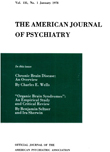Mourning in Japan
Abstract
The authors examine the process of mourning in a culture whose religions sanction the implied presence of the deceased through ancestor worship, as compared to a culture where this is not acceptable or encouraged. Most of 20 Japanese widows interviewed during the acute grief phase of mourning adhered to the cultural beliefs and were less depressed and anxious and had less difficulty accepting the loss than those who did not. The authors suggest that the almost universal Japanese custom of ancestor worship serves an important adaptive function in the work of mourning.
Access content
To read the fulltext, please use one of the options below to sign in or purchase access.- Personal login
- Institutional Login
- Sign in via OpenAthens
- Register for access
-
Please login/register if you wish to pair your device and check access availability.
Not a subscriber?
PsychiatryOnline subscription options offer access to the DSM-5 library, books, journals, CME, and patient resources. This all-in-one virtual library provides psychiatrists and mental health professionals with key resources for diagnosis, treatment, research, and professional development.
Need more help? PsychiatryOnline Customer Service may be reached by emailing [email protected] or by calling 800-368-5777 (in the U.S.) or 703-907-7322 (outside the U.S.).



